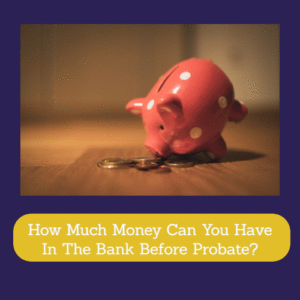 You usually need to apply for probate before you can deal with the financial affairs of someone who has died. But do you always have to? How much money can you have in the bank before probate becomes necessary?
You usually need to apply for probate before you can deal with the financial affairs of someone who has died. But do you always have to? How much money can you have in the bank before probate becomes necessary?
To be connected to a specialist probate solicitor near to where you live, please either call us now on 0845 1391399 or complete a Free Online Enquiry.
Let’s take a look into probate and learn about where different banks and building societies set the thresholds for the amount of money a deceased person can have in their bank accounts before probate is needed:
What Is Probate?
Probate is a legal process that often happens after someone passes away. When a person dies, under most circumstances, someone needs to control what happens to their estate (the collection of assets they gathered during their life – bank accounts, property, investments, but also debts).
As well as the process, “probate” also refers to the legal document that gives someone the right to do this. This document can be called:
- A Grant of Probate if the person who has died had a will. In this case, the person given that right will be the executor of the estate named in the will.
- A Grant of Letters of Administration if there was no will.
Why Is Probate Needed?
In general, if you want to deal with the assets of someone who has died – perhaps you want to sell the house they used to live in – you need to obtain the legal right to do so.
For example, banks don’t let just anyone access the accounts of people who have died. That’s why one of the things that has to be handled when a person passes away is notifying their bank so their accounts can be closed. This usually requires one of the above legal documents.
There are also some circumstances when the probate process isn’t needed:
- Small estate – when the person who has died has what is called a “small estate”, a small amount of money in the bank and little else. This is usually what people are thinking about when they’re considering bank money limits before probate. We’ll get to it below.
- All assets go to spouse – if the deceased chose to give all of their assets to their surviving spouse, then probate is not usually required.
What Is A Person’s Estate?
In legal terms, a person’s estate is everything they owned. This commonly includes:
- Money – either cash or funds they have in a bank account or building society.
- Money they are owed – this could be from other people, but could also include a life insurance policy.
- Property – such as the home or business property they own, or perhaps some land.
- Investments – shares, stocks, bonds, and other financial assets.
- Personal possessions – such as jewellery or vehicles that are worth significant amounts of money.
It’s also important to note that a person’s estate has what we might think of as “negatives” to take away from it too.
Picture a person who has died owing money to perhaps a private hospital or care facility or who has a credit card bill, for instance.
How Much Money Can You Have In The Bank Before Probate?
There aren’t really any hard-and-fast limits to the amount a person can have in the bank before probate is needed. A ballpark figure would be around £10 000 to £15 000.
Yet it’s important to realise that it is largely left up to the discretion of individual banks to set limits for the amount of money they allow before requiring a Grant of Probate (or Grant of Letters of Administration) to release funds from the account of a deceased person.
A safe figure will always be £5000 or less with no property. The more complex an estate becomes, and the closer it gets to £15 000, the more likely it is for a bank to expect the probate process to be followed.
Bank Account Limits Before Probate
The figures that individual banks and building societies have set as thresholds as of early 2023 are:
- £50 000 – Aviva, Bank of Scotland, Barclays, Halifax, Lloyds TSB, Nationwide, Santander.
- £30 000 – Britannia, Co-op Bank.
- £25 000 – Birmingham Midshires, Cheltenham & Gloucester, NatWest, Royal Bank of Scotland.
- £20 000 – Sainsbury’s Bank.
- £15 000 – M&S Money.
- £10 000 – AXA, Bank of Ireland, Post Office.
Both First Direct and HSBC decide on a case-by-case basis and NS&I varies its figure depending on the number of executors and what the will says.
All in all, the probate process isn’t always as simple as you might think. It’s always worth confirming with a legal expert you trust or asking the bank directly how much money can be in an account before probate is needed.
Need To Talk To An Expert About Probate And Whether You Need It?
Let Solicitors Near Me find you a friendly and approaching probate specialist to talk through your specific situation with.
Probate Solicitors Near Me
To be connected to a specialist probate solicitor near to where you live, please either call us now on 0845 1391399 or complete a Free Online Enquiry.

 Trust Registration Service – everything you need to know
Trust Registration Service – everything you need to know Next of kin meaning, legality, and your rights in the UK
Next of kin meaning, legality, and your rights in the UK How Long Does Probate Take UK? After a death, an estate executor or administrator is responsible for winding up the deceased’s affairs. This often involves obtaining a
How Long Does Probate Take UK? After a death, an estate executor or administrator is responsible for winding up the deceased’s affairs. This often involves obtaining a